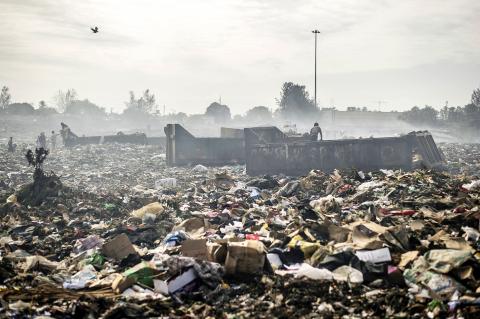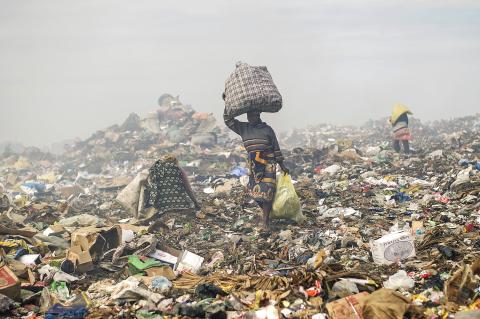In a foul-smelling, brown fog, hundreds of stooped figures pick their way like ghosts across a sea of garbage as herons wheel and dive over their heads.
A truck arrives, breaking the lethargy. With shouts and whistles, people rush from all sides, while children throw themselves onto the vehicle’s tailboards.
Clambering up, they tear frantically at its contents, unleashing an avalanche of leftovers, shredded paper, bottles and tin before the truck has even come to a stop.

Photo: AFP
This particular truck is the one that 13-year-old Jason Matthias and his friends have been waiting for: It comes from a posh area with several luxury hotels.
Jason grinned as he displayed his prize — a cream puff pastry still in its packaging — before wolfing it down. Wrested from the other children in the scrum around the truck, it is a big improvement on his breakfast of moldy bread.
Asked to name the toughest part of life at the dump, the shy teenager, who visits with his mother, pauses to think.

Photo: AFP
“Hunger,” he whispered.
More than 900 tonnes of waste is dumped daily in the landfill in Mozambique’s capital, Maputo, a city of more than 1 million people.
Over an area the size of 17 football fields, layer upon layer of garbage is piled as high as a three-story building. In places, it spills over into the surrounding residential neighborhood.
Illuminated by dozens of small fires lit to burn plastic coatings off wiring, this almost lunar landscape where garbage forms hills and valleys is busy day and night.
Jason and his mother are among at least 500 catadores (collectors) who live on what they unearth there. Most are women and children — the most vulnerable members of society — who have no other options.
Tina Feliciana turned to the dump after her husband died. The mother of three sells plastic by the kilogram to a small recycling operation close to the dump. With few buyers, she must accept what is offered. On average, she earns US$16 a month.
Even in Mozambique, where more than half the population is estimated to live on less than US$1 a day, it is hard to see how she survives.
“I am suffering, but if I didn’t do any work I would have nothing for my children,” she tells reporters.
Maputo’s five-star hotels, new shopping malls and high-rise apartments are only a few kilometers from the dump, but they might as well exist in a parallel universe.
At the landfill, the only evidence of the frenetic pace of economic growth in a nation rich in coal and gas is that there is more garbage than ever.
The southern African country has been ranked among the 10 fastest-growing economies in the world over the past decade, even before significant dividends from the fossil fuels began to flow in. The average annual growth of 7.5 percent is expected to continue this year and the next, according to the IMF.
Yet 22 years after the end of a civil war that left the economy in tatters, Mozambique still ranks 178th out of 187 countries on the UN’s annual Human Development Index.
In theory, children are not allowed at the Hulene dump, but in practice it is impossible to keep them out.
“When I started here [in 2009] few children were coming in. Now there are almost the same number as the adults,” Hulene manager Americo Zacarias said.
A baby’s cries could be heard above the din of truck engines, coming from somewhere in the garbage. After draping him hastily in bubble wrap for protection, his mother hid him so that she could scramble in the latest truckload of garbage.
To the “tut-tuts” of older women, the teenage mother slinks back, chastened, to claim the infant.
The dump is the only life that Paolo Cunha and his two siblings have ever known. Their father has been stationed at the gate, directing the flow of garbage trucks, since before they were born.
The diminutive 11-year-old spends his days perched on a dumpster. He kicks his feet against the sides — one foot in an oversized boot, the other in a plastic flip-flop scrounged from the garbage.
Going barefoot is not an option. Apart from the usual hazards like broken glass lurking in the waste, abandoned weaponry, including live ammunition, is sometimes unearthed.
“It comes in with the rubbish,” Paolo’s father, Dercio Cunha, said with a shrug.
In an effort to protect themselves from the toxic methane gas that constantly streams from the garbage, many children wear masks fashioned out of old socks or other garments, with eye holes cut out.
Just a few hours on the Hulene landfill can leave one’s lungs aching.
Grandmother Helen Arnaldo, 48, said she had been working at the dump for “maybe 20 years.” but still felt “OK.”
Hulene is considered a health hazard by people living close by. Besides the acrid fumes it gives off, in rainy summer months, the stench is unbearable and swarms of flies from the dump invade houses. Over the past decade, several public protests have been staged to get it closed.
When Mozambique’s Portuguese colonial rulers chose the site half a century ago, it was well outside the city’s limits. Before 1960, Mozambique was one of the least urbanized countries in the world, but by 2010 the urban population had increased from 4 percent to 38 percent, the UN estimates.
During this rapid phase of largely uncontrolled urbanization, Maputo engulfed the dump, so that it now lies in the heart of the urban sprawl.
In 2007, authorities announced that they would close the dump and move it to a more “sanitary” site, 20km, outside the city’s modern limits. After numerous delays the municipality now says the relocation is going ahead after it secured millions in funding from South Korea, one of the country’s new trading partners.
Yet even if it does go ahead this time, the new dump will not be ready before early 2016. It is unclear what will happen to the catadores when it closes.
“I don’t know what we will do. Perhaps we will have to become thieves,” Dercio Cunha said as his children ran off to greet the next truckload of garbage. “We will have nothing to feed our kids.”

Taiwanese suppliers to Taiwan Semiconductor Manufacturing Co. (TSMC, 台積電) are expected to follow the contract chipmaker’s step to invest in the US, but their relocation may be seven to eight years away, Minister of Economic Affairs J.W. Kuo (郭智輝) said yesterday. When asked by opposition Chinese Nationalist Party (KMT) Legislator Niu Hsu-ting (牛煦庭) in the legislature about growing concerns that TSMC’s huge investments in the US will prompt its suppliers to follow suit, Kuo said based on the chipmaker’s current limited production volume, it is unlikely to lead its supply chain to go there for now. “Unless TSMC completes its planned six

Intel Corp has named Tasha Chuang (莊蓓瑜) to lead Intel Taiwan in a bid to reinforce relations between the company and its Taiwanese partners. The appointment of Chuang as general manager for Intel Taiwan takes effect on Thursday, the firm said in a statement yesterday. Chuang is to lead her team in Taiwan to pursue product development and sales growth in an effort to reinforce the company’s ties with its partners and clients, Intel said. Chuang was previously in charge of managing Intel’s ties with leading Taiwanese PC brand Asustek Computer Inc (華碩), which included helping Asustek strengthen its global businesses, the company

Power supply and electronic components maker Delta Electronics Inc (台達電) yesterday said second-quarter revenue is expected to surpass the first quarter, which rose 30 percent year-on-year to NT$118.92 billion (US$3.71 billion). Revenue this quarter is likely to grow, as US clients have front-loaded orders ahead of US President Donald Trump’s planned tariffs on Taiwanese goods, Delta chairman Ping Cheng (鄭平) said at an earnings conference in Taipei, referring to the 90-day pause in tariff implementation Trump announced on April 9. While situations in the third and fourth quarters remain unclear, “We will not halt our long-term deployments and do not plan to

NOT OVERLY PESSIMISTIC: While consumer electronics demand remains volatile, MediaTek CEO Rick Tsai said that tariffs would have limited effect on the company Chip designer MediaTek Inc (聯發科) yesterday said revenue this quarter would contract by 4 percent sequentially in the worst-case scenario on softer smartphone demand. Revenue is expected to be between NT$147.2 billion and NT$159.4 billion (US$4.6 billion-US$4.98 billion), compared with NT$153.31 billion last quarter, the company said. MediaTek said demand for smartphone chips would be flat or slide sequentially this quarter, while demand for smart devices and power chips would go up. Mobile phone chips made up 56 percent of the company’s total revenue last quarter. Gross margin of 46 to 49 percent is forecast for this quarter, compared with 48.1 percent last